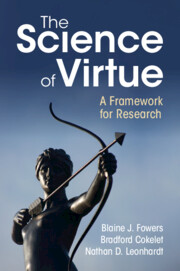Book contents
- The Science of Virtue
- The Science of Virtue
- Copyright page
- Contents
- Acknowledgments
- Introduction
- Part I Philosophical Resources and Prospects
- Chapter 1 Virtue Theory
- Chapter 2 A Philosophically Informed Virtue Science
- Part II Psychological Resources and Prospects
- Part III Organizing Virtue Research with the STRIVE-4 Model
- Part IV The Science and Practice of Virtue
- References
- Index
Chapter 2 - A Philosophically Informed Virtue Science
from Part I - Philosophical Resources and Prospects
Published online by Cambridge University Press: 11 January 2024
- The Science of Virtue
- The Science of Virtue
- Copyright page
- Contents
- Acknowledgments
- Introduction
- Part I Philosophical Resources and Prospects
- Chapter 1 Virtue Theory
- Chapter 2 A Philosophically Informed Virtue Science
- Part II Psychological Resources and Prospects
- Part III Organizing Virtue Research with the STRIVE-4 Model
- Part IV The Science and Practice of Virtue
- References
- Index
Summary
This chapter considers the appropriate roles that philosophy can play in virtue science. It develops three categories of philosophical work: (1) work that is not especially relevant to virtue science and can be set aside; (2) work that is relevant to virtue science, but is conceptual rather than empirical; and (3) philosophical topics that can be translated into testable hypotheses. Group 1 comprises the kind of philosophical work that seeks maximum generality, often transcending humans. This work can be set aside in virtue science, which is focused on human virtue. Group 2 includes philosophical work that is primarily conceptual and cannot be resolved empirically. This work includes many contentious premises on which virtue scientists may well have to take a position. We recommend that virtue scientists briefly discuss the issue and simply take a position without trying to resolve the issue. Group 3 includes philosophical positions that are amenable to empirical testing. Our recommendation is for virtue scientists to formulate and test such philosophical premises. For example, there is much philosophical debate about whether knowledge is important to virtue, and this debate can and should be tested empirically.
Keywords
- Type
- Chapter
- Information
- The Science of VirtueA Framework for Research, pp. 53 - 70Publisher: Cambridge University PressPrint publication year: 2024

